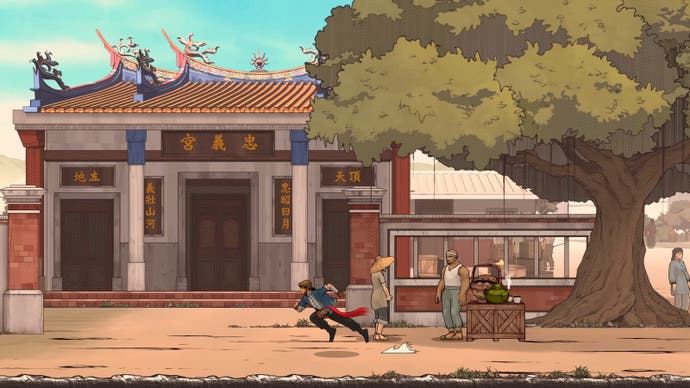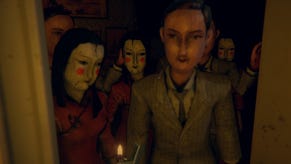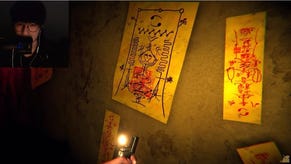The rise of Taiwan's indie scene and why it deserves our attention
Beyond Devotion.
Taiwanese indie gaming has come a long way in a short time. It's only five years since Red Candle released Detention, a surreal and harrowing expedition into the 'white terror' of political purges and martial law that dominates the island's 20th century history, and - I'm pretty sure - the first game of Taiwanese origin I'd ever played. Since then, I've discovered that more and more of the indie games I've been enjoying have been made in Taiwan. Detention now feels like a spark that led to a quiet explosion.
The growth has been equally evident to those in the midst of it. "When I first attended the indie game section at Taipei Game Show five years ago," Scott Chen, co-founder of Taiwanese developer SIGONO, tells me. "There were only around 15 Taiwanese booths, and this was the biggest game convention in Taiwan! Now there would be over 50 local teams showcasing their work among the 100 or so booths, and the overall quality has gone up significantly."
Red Candle has undoubtedly been the flagbearer for this new wave, with Detention and celebrated follow up Devotion both placing Taiwanese culture at the heart of their experiences. But at the same time, SIGONO has been making progress with its sci-fi narrative adventure series, OPUS, releasing third entry, Echo of Starsong, in 2021. And in the last few years, a range of other studios have produced impressive titles such as Carto, Vigil: The Longest Night, Behind the Frame, MO: Astray, and The Legend of Tianding that exemplify the development community's drive for distinctive experiences.
The shift has also been noted by Vlad Tsypljak, co-founder of indie publisher Neon Doctrine, which shifted its base of operations from China to Taiwan three years ago, and published both Vigil and The Legend of Tianding. "When we first came here, the only famous games really were Detention and Devotion," he says. "[Development] was still heavily mobile focused, especially on idle clicker MMOs, or Gacha games." He also explains that a lot of local talent and educational resources are funnelled towards asset creation for big foreign publishers, with the Uncharted games, Resident Evil remakes and Destiny 2 among those partially constructed in Taiwan. "But we're definitely seeing more growth in local studios pushing into the PC market," he adds, "making games about the local culture or something different, instead of rehashing western style games."
One reason the indie boom is relatively recent, Tsypljak believes, is that studios were previously struggling to monetise their output. "Taiwanese investors are often not very familiar with the industry and how things work," he says, "so developers still end up in a tough situation moneywise even when their game does well, because of the deals they structured with the investors." Another issue is work culture, which is "very focused on overworking," Tsypljak says. "We've seen studios push themselves too hard and when it's almost time to release the game everybody hates each other and they're burned out."
Now, however, there are more resources to help fledging developers strike good deals and manage workflow. Events like the Taipei Game Show, the Taipei Game Developers Forum and IGDA conferences have made it easier for studios to draw on both regional and global knowledge and experience. There are also government funded initiatives, Chen explains, "that focus on finding the right publishers for teams, or funding local devs to attend conventions abroad." And while educational resources are still a little sparse, he says, "people are eager to help each other out, and many with the linguistic chops are more than willing to help spread valuable knowledge from overseas."
This community spirit is echoed by PP, one of the team at CGCG (Creative Games Computer Graphics Corporation), the studio behind slick historical beat 'em up The Legend of Tianding. "We have very positive and active indie groups in Taiwan," they say. "Our biggest indie group is IGD SHARE. A lot of talented game designers share their knowledge on the site and stream on Twitch every month. Overall I think the resources are enough for someone who wants to make games from scratch."
These resources have helped CGCG find the right support for their work. "It is very difficult [to secure funding]," PP says. "After all, making games is a very high risk investment compared to other industries. But we got funds from an angel investor, DIT Startup and some government grants." Neon Doctrine then made the difference at the sharp end of the process, handling localisation, QA and publicity, amongst other things. "It's very important to find a publisher and become a partner with them so you can focus on what you are good at," PP says.
SIGONO took a different route, initially self-publishing their wares on mobile platforms. "When we first started out," Chen says, "we focused on small projects and poured the profits from each one into developing the next." Thanks to positive feedback and reviews, the OPUS series has now accumulated over 10 million mobile downloads worldwide. "These are the kinds of successes that have allowed us to keep making new games," Chen says.
Yet if this sounds very straightforward, Chen clarifies it was anything but. "Six years ago, we'd show our game at every event to find companies interested in partnering with us," he says. "We'd be lucky if one in ten were interested in our game, and even luckier if one in ten of those were willing to strike a deal." They also took a risk with Echo of Starsong, for the first time publishing on PC and iOS simultaneously. "We've built good relationships with the major app stores over the years, and are fairly comfortable with the idea of self-publishing," Chen says, "but it turned out to be so much harder than we imagined [on PC], especially in the western market."
In the future, however, the bigger problem may be releasing games in the Chinese mainland. Currently, Chinese players purchase games via Steam's global storefront, and Tsypljak estimates that China accounts for around 30-40 percent of the sales of Neon Doctrine's titles. The concern until now has been ensuring that games contain no politically sensitive material relating to China (as Red Candle found to its cost when it left a derogatory image of Chinese President Xi Jinping in Devotion, leading to a backlash that forced them to remove the game from sale). Even a game like The Legend of Tianding, which champions Taiwanese resistance against Japanese occupation in the early 20th century, requires astute localisation. "It's always tricky to deal with the Chinese market for the Taiwanese," says PP. "We make the game the way we want it and some descriptions of items might be considered sensitive from the publisher's Chinese team, so we incorporate a Chinese version for them."
The looming issue though is that China may soon ban the global version of Steam altogether. If that happens, games will only be sold through the heavily restricted Steam China and other local platforms, and every title will have to go through an arduous process of government certification, meeting tight guidelines for 'appropriate' content relating to violence, sex, religion and politics. For many developers, this will simply prove too costly, given the changes they may have to make and how slow and unreliable the system is. "There's still a huge backlog from a few years ago when they shut down the whole process," Tsypljak says. "When it comes to PC games, maybe three or four get through every quarter."
At the same time, Europe and North America remain difficult markets to crack, as games from Taiwan and smaller Asian territories struggle for media attention, even with the support of a publisher like Neon Doctrine. Tsypljak explains that their recent releases have sold well, suggesting that western players are open to experiences coming from Asian creators beyond Japan. But, he adds, "if editors have a choice between an indie game made in Europe or America and an indie game made in Indonesia, Malaysia or Taiwan, they always go with the ones that are made in America or Europe."
"I've had quite a lot of bad experiences," he continues. "[A journalist] approaches me and says, 'This game looks cool, we'd like to talk to the developers.' And I'm like, 'Okay, the developers' English is not so good, but I can interpret for you. Or if you send me the questions in English, we'll do the translation.' But 99 percent of them say it's too much work. They say they'd like to support developing regions and Asian games, but when push comes to shove, there's very little coverage."
Chen has had similar problems, even though he's fluent in English. "The years it took to break into the western mediasphere have honestly been quite disheartening," he says. "Selling a game without cultural barriers is difficult enough. But when you present a game that's not from the usual places, people wonder 'Is it even good? Do they even make games over there?'"
These last few years should have taught us that, yes, they definitely do make games over there and a growing number are very good indeed. "The key to success is persuading people to give your game a chance, and that's something we still have much to learn about," Chen says. If Taiwan's recent indie output is anything to go by, we shouldn't need much more persuasion. This newly thriving scene deserves every chance it can get.












